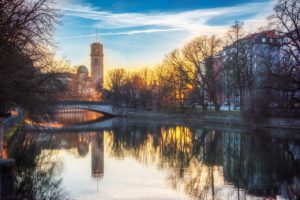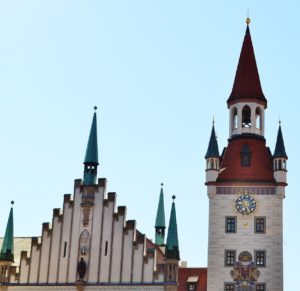Visit the Spectacular and Intriguing City of Munich
Munich is Germany’s third largest city after Hamburg and Berlin. It is the capital of Bavaria and boasts a population of over 1,300,000. Munich’s urban area includes surrounding suburbs as well as the city itself and the total population of both areas combined is well over two million. Munich offers some of the most breathtaking scenery in Europe and is one of the most important centers of the Germany’s economy. The city sits along the Isar River at the foot of the spectacular Bavarian Alps and draws in thousands of tourists each year.
Outstanding Scenery
Those who have come to Munich to experience stunning scenery will not be disappointed as tours are available to guide guests throughout the area’s grandest castles and smallest villages. Tours provide visitors with a beautiful view of the Lower Bavarian Alps, which is a sight no one ever forgets. A guided walk through the picturesque old city of Salzburg is also a must-see for anyone interested in viewing some of the more outstanding landscapes of the Munich area. Lake Mondsee can also be viewed here, which was the backdrop for several scenes in the celebrated movie “The Sound of Music.”

Mesmerizing Munich
Another excellent option for those on a sightseeing tour is a train journey into the Bavarian country-side where the mysterious castles of King Ludwig II of Bavaria, Neuschwanstein Castle, and the rustic village of Hohenschangau can all be explored at one’s leisure. The views of area’s many lakes and the Austrian Alps are also sights to remember when one embarks on a guided tour. During such an outing, families can enjoy lunch at a traditional German restaurant and beer garden, many of which sit in the shadow of some of the most majestic and beautiful castles in Germany. It is wise to bring along a camera as unique landscapes and stunning scenery can be captured on film in this amazing part of the world.
The Rise and Fall of the Third Reich
As Germany emerged from World War I with Bavaria dominated by assassination and revolution and Munich gripped by hyperinflation, the Nazi movement silently rose along with one of the world’s most evil dictators, Adolf Hitler. Anyone with the slightest interest in major world events will not want to miss a chance to explore the history of Hitler’s rise and fall as dictator of Germany, which changed the world forever. From the Third Reich’s failed attempt to grasp power at the Feldherrenhalle, to the site of the Königsplatz mass party rallies and Hofgarten’s “White Rose” resistance movement, guided historical tours are available that highlight one of the darkest times in world history.
The Sights and Sounds of Munich
Most of the city’s attractions are in the immediate vicinity, so sightseeing can be enjoyed easily by hopping on a tram or by simply strolling through the city on foot. Therefore, those who choose not to stray from Munich on their vacation will find there are many captivating sights and sounds located directly within the city limits. Munich offers attractions such as the shrine of St. Mundita and the fourth largest glockenspiel in the world. Called “the village of millions” for good reason, one can visit Nymphenburg Castle, Olympic Park—the site of the 1972 Olympic games—or the outstanding Munich Zoo without ever leaving the city.
Shopping and Nightlife
Munich nightlife is some of the best in Europe. The vast array of nightspots in the city will dazzle even those visiting from large urban areas. It includes shows, small cinemas and theaters, cabaret, live music, nightclubs and pubs. Nightlife in Munich offers entertainment from the traditional to the risqué and everything in between. The former artist’s quarter is now regarded as the city’s most fashionable section with its various cafes, bars and other nightlife venues. No one is ever disappointed when spending a “night out on the town” in Munich.
The main shopping areas are Kaufingerstrasse and Neuhauserstrasse, both of which are lined with large international chains and department stores. Boutiques and exclusive shops can also be found around Theatinerstrasse and Maximilianstrasse where excellent bargains can be found for the savvy shopper.

Artistic German Architecture
Weather
Munich has a climate that is deeply influenced by the proximity of the Alps. The fact that it is so near to the Alp’s northern edge means somewhat heavy precipitation throughout the year. For this reason it is wise to prepare for rain when visiting Munich. Violent rainstorms frequently occur unexpectedly and temperature ranges between night and day or winter and or summer are often extreme. A warm downwind from the Alps can create a sharp spike in temperature within hours, even in during the coldest season of the year.
Snow frequently falls heavily during the winter months in Munich and temperatures average in the mid 30s from December to February. The warmest month is July, which features an average temperature of 70 degrees and summer lasts from May until September.
Additional Considerations
One must carefully consider his or her travel arrangements when planning a trip to Munich and it is advisable to book accommodations in advance to avoid being shut out, especially if one plans to travel to Munich during peak season. Reservations can be made online or though the use of a local travel agent and a wide variety of hotels and resorts exist from which one can choose suitable accommodations. All-inclusive packages make an excellent choice, especially for those visiting Munich for the first time as such packages typically include airfare, accommodations and food. Certain packages also include tips and transportation to and from the airport. Whichever options one chooses, he or she is guaranteed to have the experience of a lifetime when visiting the spectacular and intriguing city of Munich.






I have been to Munich and really enjoyed this!
I would love to go to Munich